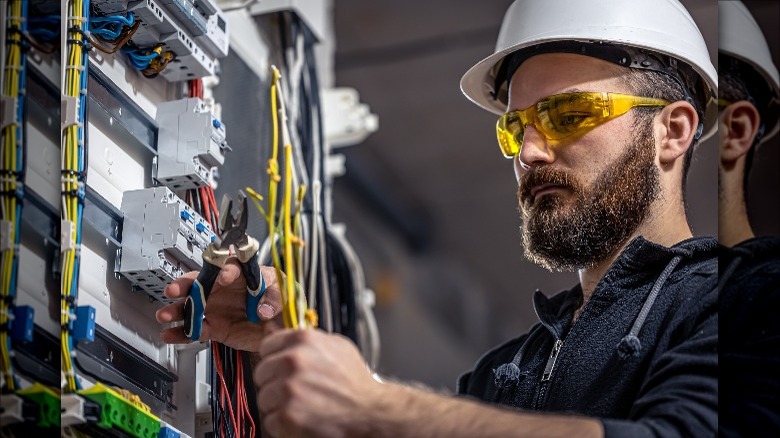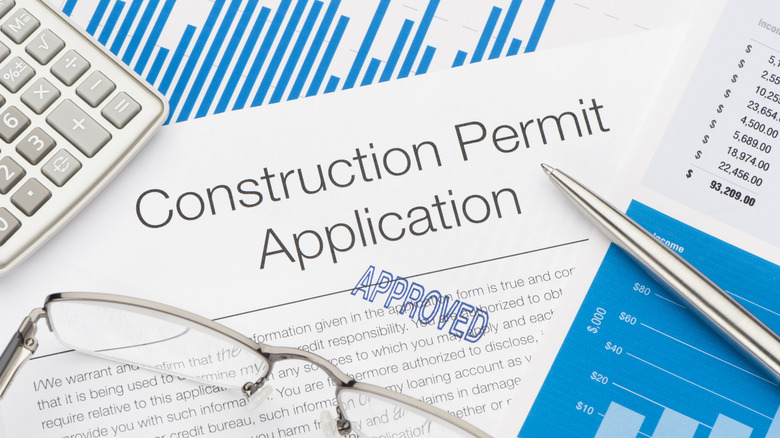Questions To Ask Before Letting An Electrician Touch Anything In Your Home
Whether you have a faulty fuse, want to update your fixtures to embrace a new lighting trend, or are looking to completely rewire your house, chances are you're looking to hire an electrician. With few exceptions, electrical work is best left to the pros, so your decision to hire a professional instead of trying to DIY a solution is a smart one. However, all electricians and companies are not equal. Before hiring anyone to complete your project(s), you'll want to learn more about their background, competency, and the approach they plan to take to address your problem.
Having a list of questions prepared can help you focus the conversation and find the information you need before making a hiring decision. With a prepared list of questions, it is also less likely that anyone will be able to take advantage of you or "sweet talk" their way into your home before you're fully confident that they're the best choice for you. After all, making sure that your electrical work is done correctly is essential. You want to make sure that the person or company you hire isn't going to put you at risk for a fire or any other serious problems.
Are you licensed, bonded, and insured?
Before hiring any electrician, one of the most important questions you'll want to ask is whether they are licensed, bonded, and insured. Each of these terms refer to different qualifications that the electrician should hold. In many states, it is required for electricians to be licensed, bonded, and insured, so if anyone answers "no" to this question, chances are they are not actually qualified to work in your state. This would be a huge red flag that you should look to hire someone else for the job.
Let's take a look at what all three terms mean to help you better understand what you're looking for in a contractor. Licensed electricians have applied for and received a license from the state or states where they work. However, these licenses do not transfer between different states. This means you'll want to confirm that the person you're thinking about hiring has a valid license in the state where you live, not a nearby one. To receive a license, electricians must pass an exam showing that they have the basic knowledge needed for the job.
Finding a bonded electrician is also important. Hiring a bonded contractor can give you confidence that they will complete the job they start, and not walk out in the middle. This is because these electricians have paid the fee to a bonding company that guarantees the work. Some smaller companies may not be able to afford these fees. If you choose to work with an unbonded electrician, you may be taking more of a risk if you're not familiar with the company's reputation.
Finally, an insured contractor is precisely what it sounds like. It means that the individual or company has purchased insurance to protect against injury, property damage, and other potential risks. If something goes wrong with your project, the contractor's insurance should cover the damage to the property or medical treatment for an injured individual.
What is your level of experience?
It will also be important to have a conversation with any potential electricians about their level of experience. Ask how many years they have been in the field, and also how much experience they have with similar projects to what you're looking for. Some may have a lot of experience with electrical work, but minimal experience with the specific project you need to have completed. While it can be tempting to try to help someone out who is just getting started, you'll want to balance this desire with making the best decision for your home. Hiring an individual with less experience could leave more opportunities for something to go wrong.
There are different types of electricians, as well, which can also help you in narrowing your search for the best individual for the job you need done. First, for most home projects, you'll want to find residential electricians (sometimes called wirepeople), not outside electricians (referred to as linespeople). Within the category of residential electricians, there are different certification levels: apprentice, journeyperson, and master. Master electricians have the most experience, having completed over 4,000 hours of work. For most home projects, you'll likely be fine with a journeyperson, who will have a license and experience in the profession. Apprentices are still in training and are not yet licensed. You would not want to hire an apprentice that isn't closely being supervised by someone more qualified.
Will you be performing the work yourself, or will you hire a subcontractor?
Depending on the scope of your project, some electricians or companies may hire a subcontractor to complete some or all of the work. Asking this question before finalizing your hiring decision can help make sure you have a full picture of who will actually be performing the work at your home. For example, if you go through the trouble of hiring a good electrician — one that is licensed, bonded, and insured — only to find that he is subcontracting the work to someone less qualified, you're understandably going to be upset.
To avoid this frustration and potential safety hazard, be upfront by asking whether any subcontractors will be hired. If the answer is yes, ask more questions to determine their experience and qualifications. Some additional questions you might want to ask include how much of the task will be handed over to a subcontractor and how many different subcontractors will be working on it. It is also a good idea to confirm that the electrician's liability insurance will also cover the work done by the subcontractors.
Is a permit required for this job?
An electrical permit will not be required for every job. However, there are many instances when pulling a permit is necessary before completing a project. Asking your contractor whether a permit is needed can supply you with important information and help you plan for the job. If a permit is required, you can follow up with questions about who will be responsible for applying for the permit and how it could affect the timeline for completing the job.
While the permit requirements can vary from one state or city to another, permits are typically required for updating the circuit breaker, installing new permanent wiring, or performing any other major work in the home. If you are hiring someone to complete a job that you believe requires a permit and they tell you that one is not actually required, it could be a red flag. Before hiring them, you might want to conduct a little more research by contacting your local permitting office to confirm whether the contractor gave you the correct information. If they did not, then that could be a sign that they're looking to skimp on following the proper procedures, and you're likely best working with someone else.
When can you start the project and how long will it take to complete?
Asking a potential electrician when they'll be able to start working and how long they foresee the project taking is always a good idea. You may see something as a simple task that shouldn't take more than a few hours, but the reality could be that it is something much more complex. The electrician should be able to give you an estimate of how long the job will take so you can plan accordingly. For multi-day jobs, it could also help to learn more about the typical start and stop times each day and whether you will need to be home while the work is being completed.
Even if something is a quick and easy job, it doesn't mean that the electrician will be available to start right away. Some contractors may have a backlog of jobs that doesn't provide them with any availability for several weeks. If you ask this question before officially hiring someone, you'll have the option to look around for someone who could come sooner. Otherwise, you may find yourself waiting longer than desired to have the work completed in your home.
How much do you charge?
Getting a price quote before hiring any electrician to work in your house is a step you should not skip. You should never sign a contract without knowing how much you will be paying for the work that will be completed. This is just leaving the door open to spending way more than you have budgeted for a specific task. When requesting a quote, ask the contractor to be detailed about what is or is not included in it. For example, does the quote include both the parts and the labor necessary to complete the job? Will there be any separate charges for travel costs?
If the electrician you are speaking with provides you with an oral quote, ask them to also give it to you in writing. Either email or physical paper will work, you just want to have a written record of what was agreed to. Having the quote in writing should help to protect you against dishonest business practices.
Do you foresee the quoted price changing after you start working?
Another important question related to the quote for the job is whether the electrician thinks that the price is likely to change after the work begins. Some jobs are more straightforward. Other times, an electrician may start a project only to realize that they will need additional supplies than they anticipated or that the work required is going to be more time-consuming than originally thought.
While the electrician you're talking with may not be able to predict exactly what could change when they start working on the project, someone with experience should be able to give you some indication of potential obstacles that they might run into. They can use these potential obstacles to present you with different scenarios and how much each would impact the total cost of the project. Gaining this information can help you mentally prepare for a higher bill than you're expecting if something does come up after the work starts.
Do you back your work with a guarantee or warranty?
Asking about whether each electrician you're interviewing offers a warranty or guarantee to back their work can help make the decision-making process easier. Choosing a bonded electrician will help ensure that the work is completed as promised, but it won't be of much help if issues arise after the job has been completed. For this reason, choosing an electrician who offers a service warranty is recommended. While product warranties will cover the devices themselves, a service warranty will back the work the contractor completes.
You should strongly reconsider working with anyone that doesn't back their work with at least a one-year warranty. Finding a contractor that offers a longer warranty will help ease any worries you have about the finished project. As you get into your search for the best electrician to work with, you'll likely find that some may even offer lifetime warranties for the work they complete.
Do you have any references to share?
Any (or at least nearly any) electrician you ask is going to say that all of their past clients have been satisfied with their work. However, nothing compares to actually speaking to some of these past clients to find out how they truly felt about the work that was completed in their house and their overall experiences working with the contractor. For this reason, you should always ask for references before making a final decision to hire someone. If a contractor is hesitant to share references with you or tries to convince you that there is no need to speak to any of their past customers, it may be a red flag that there is something they don't want you to hear.
If references are shared with you, and you have the opportunity to speak with them, ask them specific questions to find out more about the electrician or company you're working with. For example, ask how information was communicated throughout the job, whether the contractor was friendly and respectful, and whether they showed up on time and stayed on the proposed schedule. Of course, you'll also want to ask whether the people were satisfied with the work that was completed in their homes and if they would recommend working with the company or individual in question.
Are you working on a current project that I could come see?
If you'd like to go a step beyond asking to talk to past clients, you could also ask if the contractor has a current project that you could go look at. This could be especially helpful if the project they're currently working on is something similar to what you'd be hiring them to complete.
While you may not know exactly what you're looking at, especially if you don't have a lot of electrical knowledge, you can still get a general sense of how the electrician works. For example, if the home you visit has sloppily run wires, unlabeled circuit breakers, or anything else that looks disorderly, you might want to consider hiring someone different. On the other hand, if the job site appears safe and orderly, it could be an indication that the contractor is deserving of your work. If a contractor denies your request to visit a current job site, it shouldn't necessarily be a reason to reconsider hiring them. They might not have any current projects that are similar to what you're looking at, or may decide that allowing someone onto an active job is creating an unnecessary safety hazard.
Will you also inspect my home for any safety hazards or fire risks that should also be addressed?
If you're going to have an electrician working in your home, it is a good idea to ask them to perform an electrical inspection. Some companies may include this as part of their contract or service plan (if you sign up for one). But, even if they don't, you should request the service. Previous electrical work in the home may not have been completed up to code or may have since become outdated. Both of these cases can increase the risk of a fire.
Hiring an electrician to conduct an electrical inspection at least once every ten years, or any time you're making major upgrades to your home, is recommended. The electrician will identify any safety hazards, such as exposed wires and outdated or non-compliant devices. They'll also verify that your smoke alarms work and are properly placed. If any potential issues are identified, you can add them to the work order and get them taken care of at the same time as the project you had planned.











